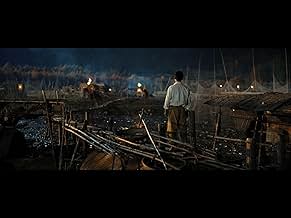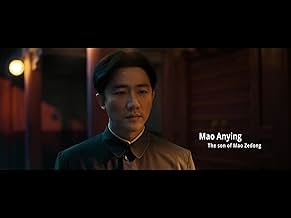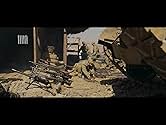IMDb RATING
5.5/10
4.6K
YOUR RATING
In the fierce battlefield in the midst of the harsh weather conditions, Wu Qian Li and Wu Wan Li, two brothers soldier including the brave Chinese soldiers must fight together and find a way... Read allIn the fierce battlefield in the midst of the harsh weather conditions, Wu Qian Li and Wu Wan Li, two brothers soldier including the brave Chinese soldiers must fight together and find a way to cope with the invasion of US forces.In the fierce battlefield in the midst of the harsh weather conditions, Wu Qian Li and Wu Wan Li, two brothers soldier including the brave Chinese soldiers must fight together and find a way to cope with the invasion of US forces.
- Awards
- 33 wins & 38 nominations total
Featured reviews
All those 1-star review bombs are exposing the current climate of McCarthyist sinophobic hysteria in the west pretty accurately.
For anyone not suffering from McCarthyist hysteria, this is a decent movie with well-crafted, tense, and dramatic action scenes. It also does it's job of illustrating the theme of ordinary people being capable of extraordinary heroics feats and self-sacrifice when under existential threat.
Also, a good choice to feature Mao Anying's participation and death in the narrative. It showcases that the social class he was born in as Mao Zedong's son mattered nothing, because death is equal to all when fighting a war.
Less well done were the scenes of the American side. The directors and script writers did provide at least a couple of scenes of American soldiers talking about home life, and I thought this was a good choice to provide the American side with some humanity. But the actors were really chewing the scenery here, especially in their line delivery, which was unfortunate. I think, however, that this can mainly be attributed to the fact that these actors are far from being A-listers. Unfortunately, China still has not build up a decent pool of ethnically non-Asian quality actors, so I foresee more of this happening in the future.
Now a bit of historical context here on China's motives for partaking in this war: A few decades before the Korean War, China had been brutally invaded by imperial Japan through the Korean peninsula, which started off the theater of WW2 in the Far East. Given that this history was still fresh in the minds of the Chinese at the time, China was very sensitive to any happenings on the Korean peninsula. For that reason, they warned the American side multiple times not to cross the 38th parallel or they would force China's hand. The Americans thought the Chinese were bluffing and crossed that line anyway. This (and the American fleets that had gone to the Taiwan Straits in the summer of 1950) convinced the Chinese that the USA would try to invade and colonize China after taking control of the Korean peninsula. To preemptively stop this threat, China decided to set up the People's Volunteer Army to defend against the existential threat.
For anyone not suffering from McCarthyist hysteria, this is a decent movie with well-crafted, tense, and dramatic action scenes. It also does it's job of illustrating the theme of ordinary people being capable of extraordinary heroics feats and self-sacrifice when under existential threat.
Also, a good choice to feature Mao Anying's participation and death in the narrative. It showcases that the social class he was born in as Mao Zedong's son mattered nothing, because death is equal to all when fighting a war.
Less well done were the scenes of the American side. The directors and script writers did provide at least a couple of scenes of American soldiers talking about home life, and I thought this was a good choice to provide the American side with some humanity. But the actors were really chewing the scenery here, especially in their line delivery, which was unfortunate. I think, however, that this can mainly be attributed to the fact that these actors are far from being A-listers. Unfortunately, China still has not build up a decent pool of ethnically non-Asian quality actors, so I foresee more of this happening in the future.
Now a bit of historical context here on China's motives for partaking in this war: A few decades before the Korean War, China had been brutally invaded by imperial Japan through the Korean peninsula, which started off the theater of WW2 in the Far East. Given that this history was still fresh in the minds of the Chinese at the time, China was very sensitive to any happenings on the Korean peninsula. For that reason, they warned the American side multiple times not to cross the 38th parallel or they would force China's hand. The Americans thought the Chinese were bluffing and crossed that line anyway. This (and the American fleets that had gone to the Taiwan Straits in the summer of 1950) convinced the Chinese that the USA would try to invade and colonize China after taking control of the Korean peninsula. To preemptively stop this threat, China decided to set up the People's Volunteer Army to defend against the existential threat.
It's 1950. American forces have landed at Incheon and driving north towards the Chinese border. The politically ambitious warmongering American military leader Douglas MacArthur insists on bombing Chinese border locations to cut off supplies and retreat for the North Koreans. Chinese leader Mao decides to answer the provocation and sends in the PLA. They would confront the Americans at Lake Changjin. The Americans would call it, the Battle of the Chosin Reservoir.
I'm not going to argue for accuracy. There is a definite deliberate slant to its views but it's not overtly wrong. A perfect example happens quite early. Somebody gets CGI happy and puts in a sky full of American fighter planes. There is more chance of them flying into each other than bombing the right targets. It's insane how many planes are in the sky on their bombing run. It's like a WWII mass bombing raid except it's utter chaos. Something similar happens to the American characters with one exception. There is one heroic competent war leader. Otherwise, the Americans are mostly arrogant, fat, and throwing up his breakfast. It's a political slant to sell to the Chinese public. I would compare this to Pearl Harbor without the romance. It's not a good thing. The CGI is a micro-step down from that. The story is over-the-top melodrama. The film is using a lot of slow-motion action. The best war scene happens quite early with the soldiers faking dead on the dry river bed. If it stayed semi-realistic, this could have been good.
I'm not going to argue for accuracy. There is a definite deliberate slant to its views but it's not overtly wrong. A perfect example happens quite early. Somebody gets CGI happy and puts in a sky full of American fighter planes. There is more chance of them flying into each other than bombing the right targets. It's insane how many planes are in the sky on their bombing run. It's like a WWII mass bombing raid except it's utter chaos. Something similar happens to the American characters with one exception. There is one heroic competent war leader. Otherwise, the Americans are mostly arrogant, fat, and throwing up his breakfast. It's a political slant to sell to the Chinese public. I would compare this to Pearl Harbor without the romance. It's not a good thing. The CGI is a micro-step down from that. The story is over-the-top melodrama. The film is using a lot of slow-motion action. The best war scene happens quite early with the soldiers faking dead on the dry river bed. If it stayed semi-realistic, this could have been good.
Commissioned by the Chinese Communist Party to commemorate their 100th anniversary, The Battle at Lake Changjin pours an entire nation's jingoistic fervour, anti-US sentiments, blatant propaganda & more into a 3-hour long war film that's no different from majority of Hollywood war films in its fact distortion & history revision but it's a tad too simplistic & predictable to deliver on the storytelling front.
Directed by Chen Kaige, Tsui Hark & Dante Lam, the story is a fictionalised retelling of the battle that unfolded between Chinese soldiers & American troops during the Korean War and is crafted in a manner that's meant to provoke nationalistic pride in its intended audience. While the first hour is uneventful, things do get better once the battle is on and the film does well to make sure the interest isn't entirely lost from thereon.
The mass battle sequences do deliver the goods but only when it's being waged in close-proximity. Still, for a $200 million production, the CGI is an absolute cringe and prevents several scenes from making their desired impact. Further weakening the ride is the narrative approach, awful dialogues, cardboard characters, excessive runtime, repetitive action, weak performances & overdone sentimentality. It is a state-sponsored picture and it shows.
Overall, The Battle at Lake Changjin has moments of spectacle and the swift pans & camera manoeuvres add the necessary cinematic touches to its action sequences but there is a lot in here that could've been further improved. The caricature depiction of US forces isn't really a complaint since most American war films do the same. However, the extreme flag-waving on display is so forceful & overpowering that it often kills the film's unabashedly entertaining aspects.
Directed by Chen Kaige, Tsui Hark & Dante Lam, the story is a fictionalised retelling of the battle that unfolded between Chinese soldiers & American troops during the Korean War and is crafted in a manner that's meant to provoke nationalistic pride in its intended audience. While the first hour is uneventful, things do get better once the battle is on and the film does well to make sure the interest isn't entirely lost from thereon.
The mass battle sequences do deliver the goods but only when it's being waged in close-proximity. Still, for a $200 million production, the CGI is an absolute cringe and prevents several scenes from making their desired impact. Further weakening the ride is the narrative approach, awful dialogues, cardboard characters, excessive runtime, repetitive action, weak performances & overdone sentimentality. It is a state-sponsored picture and it shows.
Overall, The Battle at Lake Changjin has moments of spectacle and the swift pans & camera manoeuvres add the necessary cinematic touches to its action sequences but there is a lot in here that could've been further improved. The caricature depiction of US forces isn't really a complaint since most American war films do the same. However, the extreme flag-waving on display is so forceful & overpowering that it often kills the film's unabashedly entertaining aspects.
This is just an expensive imitation of the great war movies like Save Private Ryan. The problem is, unlike in Save Private Ryan, the Chinese directors and actors did not show the war as human tragedies, where countless young lives were lost. They presented the battles as glorious, heroic and patriotic acts. This just show the mindset of the Chinese elites nowadays.
The movie did not demonise the US troops. That's an improvement. However the US officers and soldiers characters are just like movie props, with little personalities or emotions. I don't know if this is because they can't get good US actors, or because they don't want US soldiers look more humane than the Chinese.
The movie showed the huge loss to the Chinese army only in numbers, when casualties were reported by the soldiers. But the fighting scene predominately shows US soldiers got blown up into the sky, with very few scenes showing Chinese soldiers getting killed. This is the same old practices of the Chinese war movies, showing how brave and effective killing machine the Chinese army is.
For the westerners who generally do not know what happened in Korean War, and what kind of soldiers were sent over to fight. Here is a fact to ponder: a large portion of Chinese POWs refused to go back to China and were sent to Taiwan.
The movie did not demonise the US troops. That's an improvement. However the US officers and soldiers characters are just like movie props, with little personalities or emotions. I don't know if this is because they can't get good US actors, or because they don't want US soldiers look more humane than the Chinese.
The movie showed the huge loss to the Chinese army only in numbers, when casualties were reported by the soldiers. But the fighting scene predominately shows US soldiers got blown up into the sky, with very few scenes showing Chinese soldiers getting killed. This is the same old practices of the Chinese war movies, showing how brave and effective killing machine the Chinese army is.
For the westerners who generally do not know what happened in Korean War, and what kind of soldiers were sent over to fight. Here is a fact to ponder: a large portion of Chinese POWs refused to go back to China and were sent to Taiwan.
Not a bad movie, a bit long but overall good.
PS: ignore the other reviews that give it a 1. I have seen so many 1 and 10 for a movie before. Bega me to think the 1 reviews are not objective about the movie, but personal feels.
PS: ignore the other reviews that give it a 1. I have seen so many 1 and 10 for a movie before. Bega me to think the 1 reviews are not objective about the movie, but personal feels.
Did you know
- TriviaThe most expensive film ever produced in China as of 2021, with a budget of $200 million.
- ConnectionsFeatured in Zomergasten: Garrie van Pinxteren (2024)
- How long is The Battle at Lake Changjin?Powered by Alexa
Details
Box office
- Budget
- $200,000,000 (estimated)
- Gross US & Canada
- $342,411
- Opening weekend US & Canada
- $105,768
- Nov 21, 2021
- Gross worldwide
- $902,548,476
- Runtime2 hours 56 minutes
- Color
- Sound mix
- Aspect ratio
- 2.39 : 1
Contribute to this page
Suggest an edit or add missing content





































